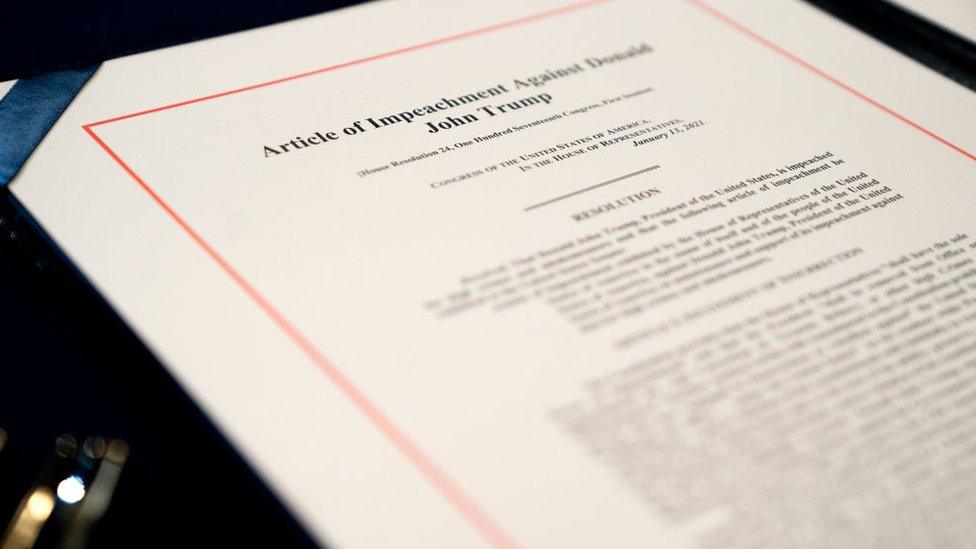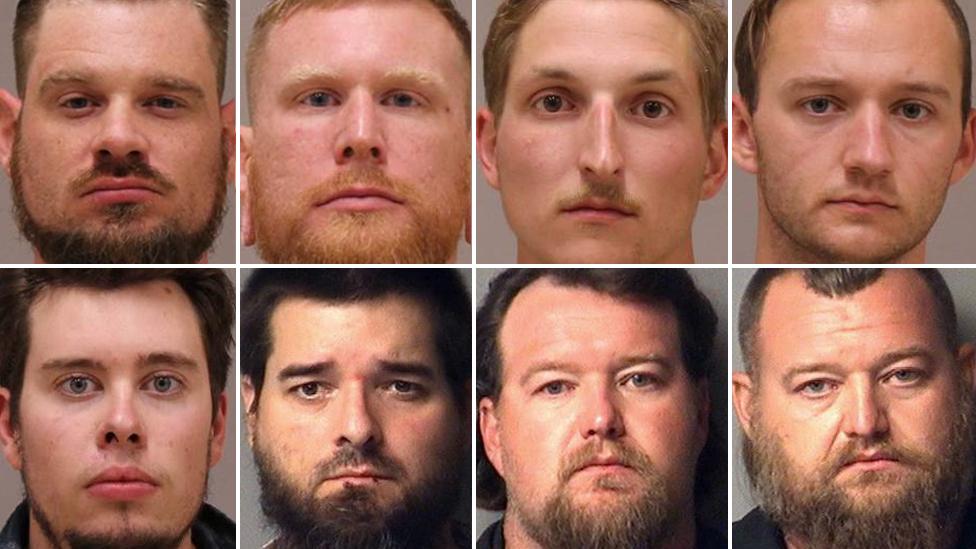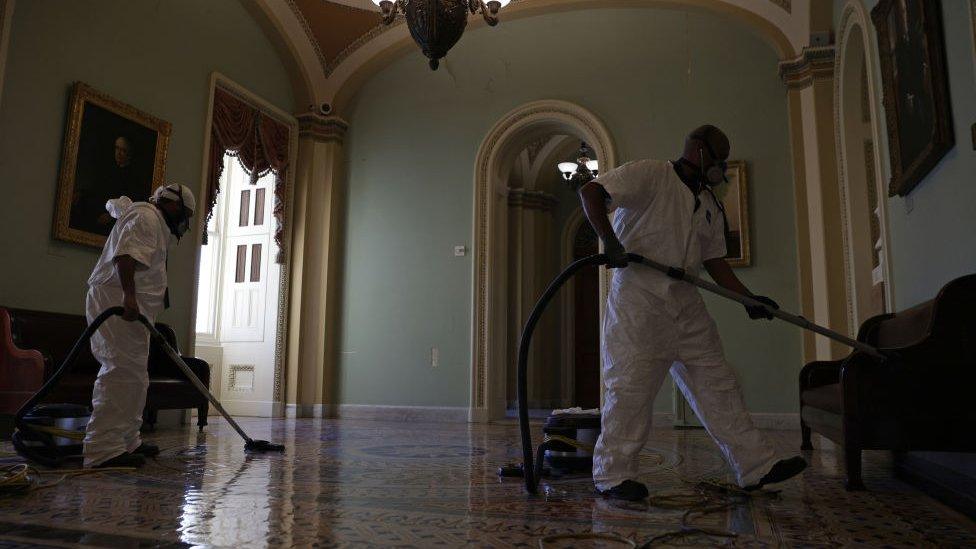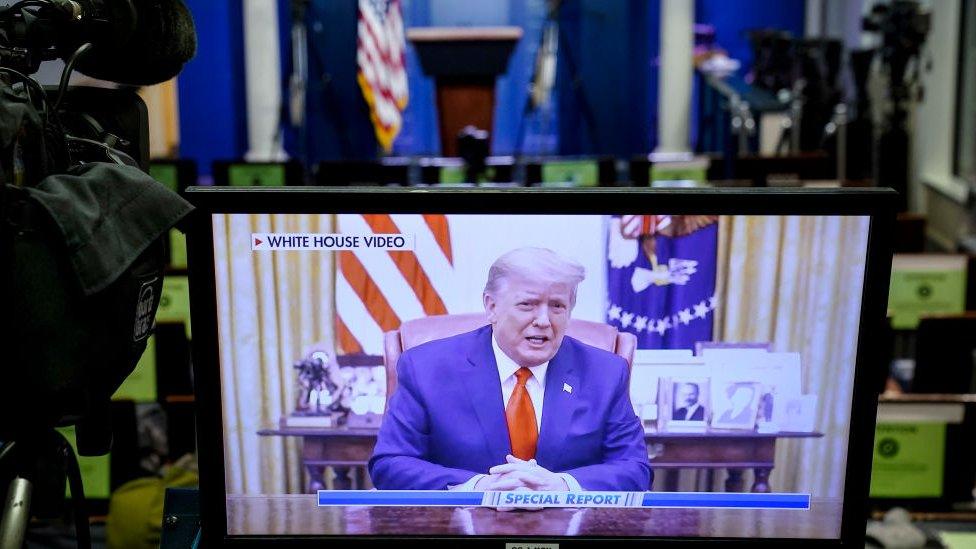Trump impeachment trial: Key takeaways on day three
- Published
"We humbly ask you to convict President Trump"
For almost a month, the House impeachment managers had been preparing for this day, when they brought their case against Donald Trump for inciting an insurrection at the US Capitol to a close.
Their presentation was as much about setting the evidence for the American public and the history books as it was convincing 67 out of 100 senators to convict. To do this, they laid out a three-part roadmap of their prosecution.
Yesterday, they tried to show how Trump provoked the attack on the Capitol, then went - step by step, in meticulous detail - through the events of that day. Today, they discussed the "harm" that the president has done with his words and actions - harm that, they said, went well beyond the violence of 6 January.
Here are some key takeaways.
'Trump told us to do it'
On Wednesday, the House impeachment managers tried to use Donald Trump's own words - in speeches and tweets - against him. On Thursday, the Democrats started the day citing the words of his supporters.
The goal was to illustrate that the group of supporters who turned from a rally crowd to a band of insurrectionists intent on storming the Capitol did so because they believed they were doing the president's bidding. Citing social media posts, recorded video and court documents, Congresswoman Diana DeGette of Colorado laid out the evidence.

"We were invited by the President of the United States," one rioter is heard shouting. Others testified that they were doing the president's bidding; that he had ordered them to the Capitol.
The Democratic impeachment managers had spent hours drawing a line from Trump to the riot of 6 January. Now they were drawing a line from Trump's base to that fateful day. Their next, greatest challenge will be connecting the two.
An escalating pattern of unrest
Was the April 2020 protest at the Michigan state capitol a "dress rehearsal" for the January US Capitol attack, asked House impeachment manager Jamie Raskin?
The images certainly look strikingly familiar. An angry crowd waved Confederate flags, wore Trump-themed clothing and confronted law enforcement blocking entry into the building's legislative chambers.
Michigan has been a hotbed of right-wing fringe movements for decades. The men behind the 1995 bombing of the federal building in Oklahoma City, Timothy McVeigh and Terry Nichols, trained for a time with a Michigan-based extremist militia.

Top (L-R): Adam Fox, Brandon Caserta, Daniel Harris and Kaleb Franks. Bottom (L-R): Ty Garbin, Eric Molitor, Michael Null and William Null
Several of the individuals arrested by the FBI in October for plotting to kidnap and murder current Michigan Governor Gretchen Whitmer also had ties to the state's extremist movements.
"If we don't draw the line here, what's next?" Raskin told the Senate when discussing the Michigan unrest last year. "What makes you think the nightmare with Donald Trump and his law-breaking violent mobs is over?"
The House impeachment managers tried to show a pattern of escalating unrest that first took shape in Michigan, reached the heart of the US government in a matter of months and could continue to fester unless stopped.
"I'm not afraid [Trump] is going to run again in four years," Congressman Ted Lieu of California said on Thursday. "I'm afraid he's going to run again and lose. Because he could do this again."
Trump showed 'no remorse'
The House's impeachment prosecution hinges on proving that Donald Trump knowingly incited his crowd of supporters in front of the White House on 6 January to attack the Capitol and stop the joint meeting of Congress from certifying Joe Biden's election victory.
To prove this, they've documented the months the then-president spent convincing his followers that the November presidential election was fixed, that his victory was stolen away. They've argued that the president has a history of inciting violence, from targeting protestors at his rallies to expressing sympathy for "both sides" following the violent 2017 white supremacist rally in Charlottesville, Virginia.
See how close the mob got to Mike Pence, Mitt Romney and other lawmakers
If that isn't enough to convince the Senate jurors - and the American public - Congressman Ted Lieu pointed to Trump's behaviour after the Capitol as an indication that he had no interest in forcefully condemning the violence.
He played clips of the two short videos the then-president released and noted that he never visited the Capitol to review the damage or pay honour to the police officer killed by the mob.
His silence and inaction, Liu said, spoke volumes.
"When you or I make a mistake and something very bad happens, we would show remorse," impeachment manager Ted Lieu said on Thursday. "We would accept responsibility. President Trump didn't do any of that. Why not? Because he intended what happened on January 6."
'A diminished nation'
Among the "harms" that the House impeachment managers said resulted from the riot at the US Capitol were not just physical and psychological, they were also damage to US security and prestige.
Congressman Joaquin Castro detailed the documents and information that was ransacked by rioters when they stormed the Capitol. He noted that one woman allegedly tried to give a laptop from Speaker Nancy Pelosi's office to a friend to sell to Russian intelligence.

The damage, he said, goes beyond that, however. He quoted leaders in Russia, Iran and China celebrating what they saw as US humiliation. He also quoted allies, like Canadian Prime Minister Justin Trudeau, who lamented that the riot was "shocking, deeply disturbing, and frankly saddening."
"When other countries have seen chaos, our constitution has helped keep order in America," Castro said. "This is why we have a constitution. We stand up for the rule of law because the rule of law doesn't just stand up for itself."
It was a play to the Senate's sense of patriotism. Many of the senators in the room take a keen interest in foreign affairs. Twenty of them serve on the chamber's foreign relations committee. The entire Senate votes to confirm US ambassadors and ratify US treaties.
Failure to convict Donald Trump, he concluded, would "forfeit" US power and diminish the nation on the world stage. Perhaps, Castro thought, the senators listening would find that concerning.
A First Amendment prebuttal
The central focus of Donald Trump's impeachment trial defence has been, and will continue to be, that the entire trial is invalid; that as an ex-president he is ineligible for punishments meant for presidents.
If that doesn't work, however, Trump's next line of defence is that he was exercising his constitutional right to free speech during his rally on the morning of the Capitol riots and in the days leading up to it.

Toward the end of the prosecution presentation, head impeachment manager Jamie Raskin - himself a constitutional law professor - attempted to respond to that defence in advance.
He asserted that Trump, with his speech, directed a mob to take away the free speech rights of members of Congress. He said that his conduct was an assault on the rule of law and, by extension, the entire Constitution, including the First Amendment, which protects free speech. And he repeated an analogy he made in his opening remarks on Tuesday.
Trump's words were not like a private citizen yelling fire in a crowded theatre, he said. It was like a fire chief who directs a mob to burn down a theatre and then celebrates as the flames spread.
He took just a few minutes to outline his "prebuttal". Trump's defenders will have up to 16 hours in days ahead to make their case.
